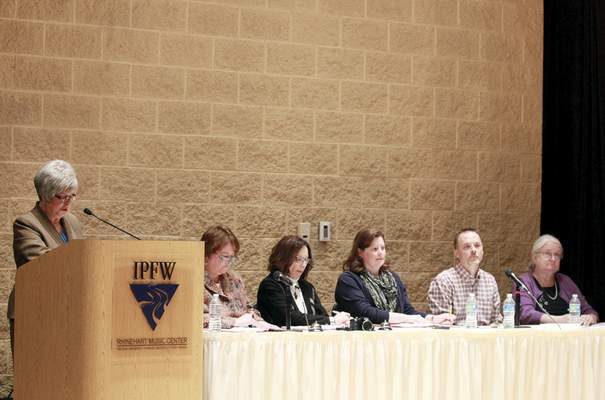 Assistant Director of Strategic Communications Anne Gregory, seated far left, judged the Journal Gazette Regional Spelling Bee, and has been judging for the last 20 years.
Assistant Director of Strategic Communications Anne Gregory, seated far left, judged the Journal Gazette Regional Spelling Bee, and has been judging for the last 20 years.
Photo by Rachel Von, The Journal Gazette
Gregory Reflects on Judging Area Spelling Bees
Rocco Hanes
Every year some of the brightest young students in the nation step up to the microphone in hopes of spelling their way to a $50,000 prize. The Scripps National Spelling Bee is an annual spelling competition that features the best young spellers in the nation. But to reach this nationally televised competition on ESPN, these competitors have to win a county spelling bee followed by a regional bee. And one of Manchester’s own has been judging these competitions for the last 20 years.
Anne Gregory, assistant director of Strategic Communications, first started judging as an employee of The Journal Gazette, a daily newspaper in Fort Wayne, before taking on her roles at Manchester University. For her first 10 years as a volunteer, she judged county bees, and the second 10 were spent judging the regional bees.
During Gregory’s time as a judge, she had multiple jobs to take care of while on duty. Some of these included listening carefully to each letter said by the speller and to ring the bell when appropriate to signify the word had been spelled incorrectly. When a challenge to a word was called by the speller, parent or coach, she conferred with the other judges to see what had been called was accurate. She also had to watch out for competitors stalling from spelling, and to watch out for unsportsmanlike conduct among spellers. If she saw anything, the participants would be disqualified from the competition.
Gregory found this volunteer work to be worthwhile. “I enjoyed my time judging,” she said. “Each competition is intense and I appreciate that the bee celebrates grit, hard work and excellence.”
Gregory has a lot of memories from her judging days. She recalled how interesting it was to see the different methods of each speller, from spelling the words on their hands, looking off into space or rushing through the words as fast as they could.
Another fond memory was the beginning of each spelling bee, when the judges would give each speller an easy word, one that did not count toward elimination, to ease the competitors into spelling on stage.
Spelling bees are not always a good time though. Gregory remembered when a young speller was eliminated, and the competitor’s parent believed that she and her fellow judges had cheated because the word was not on the study list. They explained to him that the spelling bee rules state that they are allowed to use any word from the Merriam-Webster Dictionary. She said the worst part of it all was how embarrassed the speller had been.
The worst moment in Gregory’s judging career came after a spelling bee was over. She remembers how after all the volunteers had cleaned up and were on their way out the door, the runner-up was sitting outside alone, as his family did not come to watch, and had gone to go do other things without the speller. The volunteers decided on the spot to stay with him to cheer him up until his parents could pick him up.
Indeed, Gregory has a P-A-S-S-I-O-N for spelling bees.